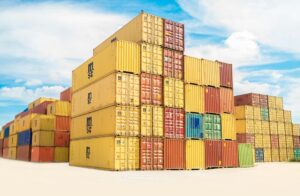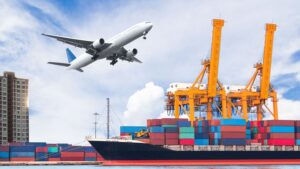Venturing into the exciting world of import and export opens doors to a global marketplace. If your business journey involves shipping from China to Zambia, you’ve landed on the right page. This comprehensive guide equips you with the knowledge and strategies to ensure a smooth and successful shipping experience.
Choosing the Right Shipping Method: Speed or Savings?

The ideal shipping method hinges on a crucial balance: speed versus cost. Let’s delve into the two primary options:
- Air Freight: Expeditious – ideal for time-sensitive cargo or perishables. Shipments typically arrive within 5-10 business days. Expect higher costs compared to sea freight.
- Sea Freight: Cost-effective – suitable for bulky or non-perishable goods. While transit times can range from 4-8 weeks, sea freight offers significant cost savings, especially for large volumes.
Beyond Speed and Cost: Additional Considerations
Your choice extends beyond speed and cost. Here are some additional factors to ponder:
- Cargo weight and dimensions: Different methods have limitations. Air freight often has stricter weight and size restrictions compared to sea freight.
- Cargo type: Certain goods may have specific transportation requirements. Perishables necessitate temperature-controlled air freight, while hazardous materials come with special regulations.
- Level of urgency: If time is of the essence, air freight is the clear victor. For less pressing deliveries, sea freight provides a budget-friendly alternative.
Customs and Import Regulations in Zambia: Ensuring a Smooth Clearance

Understanding Zambian customs regulations is paramount for a seamless import process. Here’s a breakdown of key points to remember:
- Import duties and taxes: Research applicable duties and taxes for your specific goods using the Zambia Revenue Authority (ZRA) tariff book https://www.zra.org.zm/.
- Required documentation: Prepare necessary paperwork, including a commercial invoice, packing list, bill of lading (for sea freight), and certificate of origin. Additional documentation might be required depending on the nature of your goods.
- Restricted or prohibited goods: Familiarize yourself with Zambian regulations regarding restricted or prohibited items. Items like firearms, ammunition, and certain agricultural products may require special permits or be entirely banned.
Packaging and Labeling Requirements: Protecting Your Goods and Facilitating Clearance
Proper packaging safeguards your cargo during the long journey from China to Zambia. Here are some essential guidelines:
- Use sturdy, high-quality materials: Cardboard boxes with adequate cushioning are ideal for most goods. Heavier items might necessitate wooden crates for enhanced protection.
- Secure packaging: Employ strong tape and strapping to ensure your boxes or crates remain securely sealed throughout transport.
- Clear and accurate labeling: Affix clear and comprehensive labels on all packages. Include recipient information, contents description, weight, and any special handling instructions.
Calculating Shipping Costs: Budgeting for a Successful Delivery

Accurately estimating shipping costs empowers you to make informed decisions. Here’s a breakdown of the primary cost components:
- Origin and destination charges: Costs vary depending on the origin city in China and the final destination within Zambia.
- Chosen shipping method: Air freight is pricier than sea freight.
- Cargo weight and dimensions: Shipping costs are often calculated based on weight or dimensional weight (whichever is higher).
- Fuel surcharges: Be mindful of potential fuel surcharges that may fluctuate based on global oil prices.
- Customs clearance fees: Factor in potential customs duties, taxes, and any brokerage fees associated with clearing your goods through Zambian customs.
Tips for Successful Shipping from China to Zambia: Streamlining the Process
Here are some valuable tips to streamline your China-to-Zambia shipping experience:
- Plan in advance: Research shipping options, costs, and customs regulations well before your shipment departs.
- Consolidate shipments: If you regularly import from China, consider consolidating smaller shipments to reduce overall costs.
- Work with a reputable freight forwarder: A freight forwarder can handle logistics, documentation, and customs clearance, saving you time and ensuring compliance.
- Obtain cargo insurance: Protect your investment with cargo insurance to mitigate potential losses due to damage or loss during transit.
- Track your shipment: Most reputable shipping companies offer online tracking tools for you to monitor your shipment’s progress.
Tracking and Insurance Options: Peace of Mind During Your Shipment’s Journey

Real-time Tracking: Most shipping companies provide online tracking tools that allow you to monitor your shipment’s location and estimated arrival date. This transparency fosters peace of mind throughout the transportation process.
Cargo Insurance: Cargo insurance offers a safety net against unforeseen circumstances. It shields you from financial losses if your goods are damaged, lost, or stolen during transit. Here are some key points to consider when choosing cargo insurance:
- Declared value: The insurance value should reflect the replacement cost of your goods at their destination in Zambia.
- Coverage type: There are various types of cargo insurance coverage available. Common options include “all-risks” coverage, which protects against a wide range of perils, or more specific coverage tailored to your cargo type.
- Premiums: Insurance premiums are typically calculated based on the declared value, chosen coverage type, and the inherent risks associated with your specific shipment.
Working with a Freight Forwarder or Shipping Agent: Leveraging Expertise
Partnering with a freight forwarder or shipping agent can significantly simplify your China-to-Zambia shipping endeavors. Here’s how they can add value:
- Streamlined logistics: Freight forwarders handle all aspects of the shipping process, from booking cargo space to arranging customs clearance. This frees you to focus on your core business activities.
- Cost optimization: Freight forwarders often have negotiated rates with shipping companies, potentially securing you more competitive prices.
- Customs expertise: Navigating customs regulations can be intricate. A freight forwarder with experience in Zambian customs procedures can ensure a smooth clearance process.
- Reduced risk: Freight forwarders can help mitigate potential risks associated with international shipping, such as delays or damaged goods.
Finding the Right Freight Forwarder:
Selecting a reliable freight forwarder is crucial. Here are some pointers to guide you:
- Experience: Seek a freight forwarder with a proven track record in handling shipments between China and Zambia.
- Service offerings: Ensure the freight forwarder offers the services you require, such as customs clearance assistance and cargo insurance.
- Reputation: Research the freight forwarder’s reputation by reading online reviews and checking industry references.
- Competitive rates: Compare quotes from several freight forwarders to secure the most cost-effective solution.




